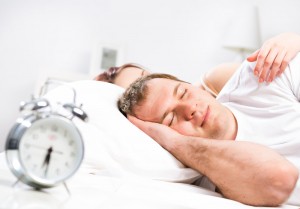Sound Advice for Sound Sleep
How much sleep a person actually requires varies from one person to another. Most people need between seven and eight hours every night to function optimally. Some people claim to need less sleep, but research shows that people who sleep much less over a period of time don’t perform as well on complex tasks as do people who get seven to eight hours of sleep a night. Research also shows that getting much less or much more than this is associated with a higher death rate.
Insomnia is a disorder that makes it difficult to fall asleep and/or stay asleep. For a person that suffers from chronic insomnia, it can touch all areas of life, including relationships, health, and work. Symptoms of insomnia may include; awakening too early, not feeling well rested after a night’s sleep, fatigue, irritability, and incessant worries about sleep.
There are numerous factors that can lead to insomnia. Anxiety, worry, and stress are among the most common causes, and can be brought on by countless life issues. Sometimes your biggest worry is that you won’t be able to fall asleep!
 Undiagnosed depression can also contribute to worry and anxiety that keep you awake.
Undiagnosed depression can also contribute to worry and anxiety that keep you awake.
Many prescription and over the counter drugs can interfere with sleep, as can various medical conditions. Anything that causes chronic pain, such as arthritis, can interfere with sleep, so can gastroesophageal reflux disease (GERD), sleep apnea, or having an overactive thyroid. Your doctor may suggest some changes that can be helpful, such as taking a pain reliever before bed.
Many people experience insomnia from time to time, but if it lasts more than a few weeks you should consider talking with your doctor. Lack of sleep can be detrimental to your health by affecting your immune system. Studies show that when people who don’t get good quality sleep or enough sleep are exposed to a virus or infection they are more likely to get sick. Your body reduces the production of infection fighting antibodies and cells during periods of sleep deprivation. On going lack of sleep also increases your risk of diabetes, obesity, and heart disease.
In addition, if insomnia makes it hard for you to function during the day, especially if you are making an unusual amount of errors or having accidents, see your doctor to determine what might be causing your sleep problem and how it can be treated. If your doctor suspects you may have a sleep disorder, he will refer you to a sleep center for a sleep study.
In the meanwhile, some things your doctor may advise you to do that are known to be helpful for insomnia are; have a regular sleep schedule. That means going to bed and getting up at the same time every day, no sleeping in on weekends. Doing this consistently teaches your body a regular sleep-wake cycle.
Attempt to create a room that’s ideal for sleeping. Often, this means cool, quiet, and dark. Be certain that your mattress, pillow, and bedding feel comfortable.
Creating a bedtime ritual may also help. Try doing the same things every night to signal to your mind and body that it’s time to wind down. For example, some people find a warm bath and a good book to be relaxing.
Many doctors recommend avoiding TV and computers two hours before bed, citing the light as interfering with the natural sleep cycle. On the other hand, if you worry about falling asleep, you will find it even more difficult to nod off. So if you find that you worry excessively about not being able to sleep, and try too hard to fall asleep, stop trying. Do something relaxing to take your mind off it, such as watching TV or reading.
People who suffer from insomnia tend to nap during the day to fight the fatigue. This can become a vicious circle, as daytime naps can interfere with nighttime sleep. If you must nap during the day, make it thirty minutes or less and no later than three o’clock.
What you eat and drink also affects sleep. Nicotine and caffeine are known stimulants which can take hours to wear off. Though many people think a night cap will help them sleep, the fact is that it may make you feel sleepy at first, but it can disrupt sleep later in the night. In addition, avoid going to bed hungry or overly full and limit your fluid intake before bed, so you won’t be disturbed by nighttime trips to the bathroom.
Again, if these changes don’t help, your doctor can refer you to someone who specializes in sleep disorders.
Published By:
Lift & Stor Beds – Jennifer Abbey
9124 E. Main St., Suite 7
Mesa, AZ 85207-8735
Phone : 480-380-8018
Website: //storagebeds.com





